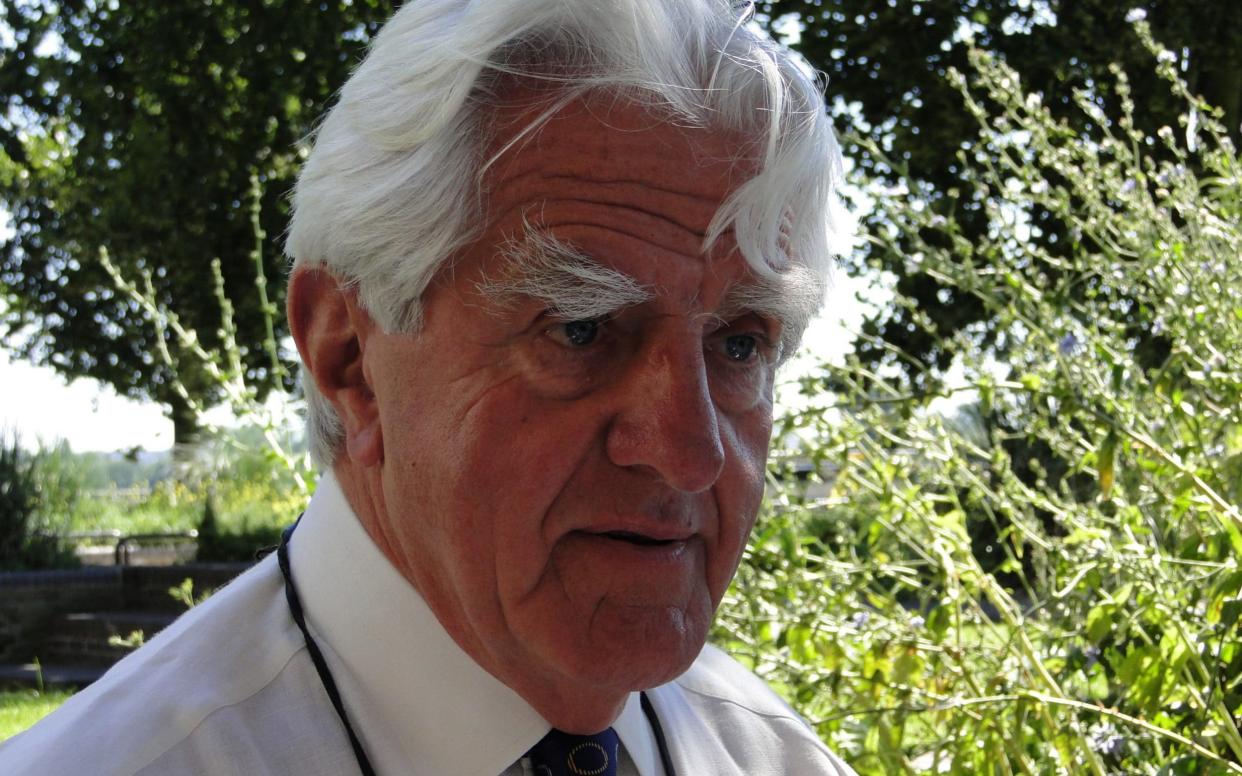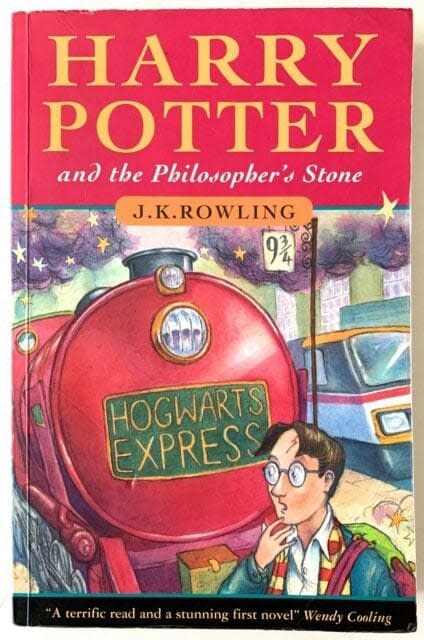Christopher Little, literary agent who steered JK Rowling and Harry Potter to global success – obituary

- Oops!Something went wrong.Please try again later.
Christopher Little, who has died aged 79, was the literary agent who was instrumental in turning JK Rowling from a penniless divorced mother into the world’s richest author; one of his rivals, Ed Victor, described him as “the luckiest agent ever”.
In 1995, the 29-year-old Joanne Rowling – then living on benefits in a one-bedroom flat in Edinburgh with her infant daughter, Jessica – went to her local library to pick a new literary agent out of the Writers’ and Artists’ Yearbook. She had already tried one agent, who rejected her (and kept her ringbinder, which she could barely afford to replace). She settled on “Christopher Little” because, she said, it sounded like a name from a children’s book, and posted him the first three chapters of Harry Potter and the Philosopher’s Stone.
When it reached Little’s office – near-Dickensian premises in the vicinity of Victoria Station, cramped, dirty, filled with tottering piles of paper, and reached by what one associate described as “the smallest lift in London” – the manuscript went straight into the rejection basket because Little thought that “children’s books did not make money”.
But the office manager, Bryony Evens, liked the look of its distinctive binding, rescued it from the bin, read the synopsis and took it to Little for a second chance. “I thought there was something really special there,” he decided. Within four days, he wrote back to Rowling, asking to see the rest of the manuscript on an exclusive basis. “It was the best letter of my life, including love letters,” she said. “I read it eight times.”
Tall and imposing, with a shock of white hair and monumental eyebrows, Little was unusual among London literary agents in that he came to the business late, without a background in publishing, or a university degree. He had left school at 16, and spent the first decade of his working life all over the world, selling carpets, carbon paper and worsted suiting – a schooling in steely negotiation, which he coupled with the warmth of the bon viveur.
When Rowling sent in her manuscript, Little had only been running his agency full-time for three years. It was a small outfit, its finances pinched. One of his clients had been advised by a lawyer to have his royalties paid straight into his own account, bypassing the company, to be sure he actually got the money. “Rightly or wrongly you used to get the impression that the business was about to go under at any time.”
When Little came to submitting Harry Potter and the Philosopher’s Stone to publishers, he had to do it as cheaply as possible. Instead of making 10 copies, as was usual, he asked Bryony Evens to make three. When one publisher, due to illness, could not look at the book immediately, she was embarrassed to have to ask for it back so that she could send the precious manuscript out to someone else.
Notoriously, the book was turned down by every major publisher in Britain – 12 in all. Little eventually pulled a string by asking Barry Cunningham, at the young firm Bloomsbury, to read the manuscript as a favour to him. “It wasn’t the freshest pile of papers so I knew it had been turned down a few times,” recalled Cunningham. But Bloomsbury did buy the UK Commonwealth rights, for an advance of just £2,500, with a minute first run of just 500 hardback copies, but with very high royalties – double the norm – if it went on to sell in volume.
Little considered this deal his masterstroke. He spent the next two years refusing to discuss any further rights – overseas or film – until the book came out in 1997. By that point, thanks to word of mouth, he was sitting on the hottest property in publishing. “We just sat back and waited for the offers to come in,” he recalled.
In 1998, he sold the US rights to scholastic for $105,000 and the film rights to Warner Brothers for $1.8 million. He went on to mastermind her career, carefully protecting the Harry Potter brand. (He once blocked a 10-minute charity ballet based on Harry Potter, informing the dismayed ballet teacher that the rights “are reserved to the author”.)
“Remember, Joanne, this is all very well, but it’s not going to make you a fortune,” he had warned her at the start. JK Rowling is estimated to be worth £795 million; Little’s own wealth is thought to have exceeded £50 million. “Christopher Little was the first person in the publishing industry to believe in me,” Rowling said this week. “He changed my life.”

Christopher John Little was born in York on October 10 1941, the son of Nancy Pickersgill, a former secretary, and her husband Bernard Little OBE, an RAF pilot who flew Spitfires in the Battle of Britain with 609 (West Riding) Squadron, and then became a coroner, notably at the inquest of Lesley Ann Downey, one of the Moors murder victims. Little and his brother David were brought up in Liversedge, West Yorkshire, and attended Queen Elizabeth Grammar School in Wakefield.
Little passed five of his O-Levels, then, advised by his headmaster to consider “a business career – sales management for instance”, he left school to join his uncle’s textile firm in 1958. The next year, he moved to the carpet manufacturers T F Firth as an export sales trainee. In 1961, thanks to the Bradford Chamber of Commerce, he got a scholarship to learn French and work for the firm’s affiliate in Paris.
He was there for a year, and, after a spell back in Yorkshire, went abroad again as soon as he could, selling office supplies of carbon paper on commission all over France. There, he discovered the secret of a truly satisfying meal when money was short, which was to order two eggs in a café – as if by magic, a long, crusty baguette would turn up as well. Decades later, as an agent, Little was known for his hospitality – breakfasts at the Wolseley; long, languid lunches. He was very fond of good wine: “Something you can tell from my somewhat orotund belly”.
Little went on selling carbon paper in Thailand, Malaya, Singapore and Borneo before reaching Hong Kong in 1965, where he got a job at the local office of the Manchester textile firm Sir Jacob Behrens and Sons, selling high-quality British worsted suiting to wholesalers in Hong Kong, Japan and Singapore. Little also developed a secret gambling method which, he later said, worked well in the casinos and allowed him to make a small profit.
In 1967 he moved into selling mutual funds and in 1970, thanks to his fluent French and knowledge of Asia, joined Swiss Bank Corporation as its Far East representative, travelling through Vietnam, Cambodia and Laos. In 1974, Little moved back to London and set up Christopher Little Consultants, recruiting for jobs in construction and manufacturing in the Middle East.
It was an old friend from Hong Kong, Philip Nicholson, who persuaded him to try his hand at selling books for a change. Nicholson had written a thriller, Man on Fire, under the pseudonym AJ Quinnell, and Little found him an American publisher. It sold 7.5 million copies and became a Hollywood film. Pleased, Little founded the Christopher Little Literary Agency. “It was really a hobby which started through an accident,” he said. Only in 1992 did he sell his consulting firm and devote himself to the agency, which by then represented 20 authors.
When the Harry Potter juggernaut took off, Little could have been forgiven for streamlining his client list down to one, but he did not. In 1996, he took on 23-year-old Darren Shan, another children’s author, whose books, including Cirque du Freak (which was turned down by 20 publishers), have gone on to sell 30 million copies.
Even when Harry Potter turned into a multi-million-pound franchise, Shan said: “I never had the feeling that I was in any way secondary.” In the final weeks before his death, Little was negotiating a television deal for Cirque du Freak. “If Chris believed in you, he remained loyal,” said Shan. Among his other authors were Kate McCann, with her book Madeleine: Our daughter’s disappearance and the continuing search for her, and General Sir Mike Jackson.
In 2011, however, just before the premiere of the final Harry Potter film, Rowling broke off relations with Little, appointing as her new agent Neil Blair, the lawyer who had been her copyright “Rottweiler” at Little’s firm. There was widespread shock.
Rowling called it a “painful decision”, saying she had “actively sought a different outcome for weeks” but that it was finally “unavoidable”. Little’s spokesman retorted that it “came out of the blue. He was surprised to say the least.” Friends reported him to be “extremely angry” but that the previous weeks had been “a nightmare”. There was a subsequent settlement; Little, a very private man, would never be drawn on what had gone wrong. When asked, he only “twinkled”.
Enormous wealth did not seem to change Little. He liked sailing but never bought a yacht, preferring to “rent the boats when I want them – it does save a lot of hassle”. Although he did give a party for his 60th birthday in the Chelsea Physic Garden that cost £250,000, and once wrote a friend in need a cheque for £1 million, the loan guaranteed only by a handshake, he was content to remain in the Fulham town house he had bought in the early 1990s.
He loved rugby and went to many games, and was always in particularly fine form after an England victory. His voice, which retained a touch of Yorkshire, was deep and warm. He was always impeccably turned out, rarely seen outside a suit and tie, and he embodied an old-world courtesy, which prompted him to stand up whenever anyone new walked into the room.
After his first marriage, to Linda Frewen in 1975, ended in divorce in 1987, he brought up their two sons, Kim and Nicholas, as a single parent. He is survived by his children, and by his widow Gilly, whom he married in 2012.
Christopher Little, born October 10 1941, died January 7 2021

